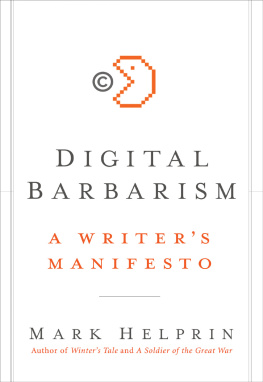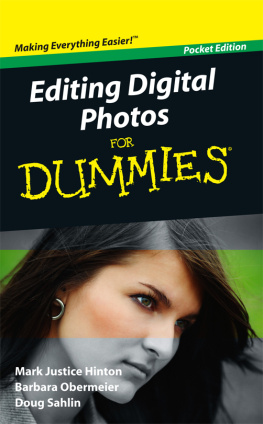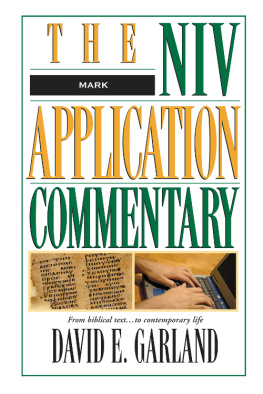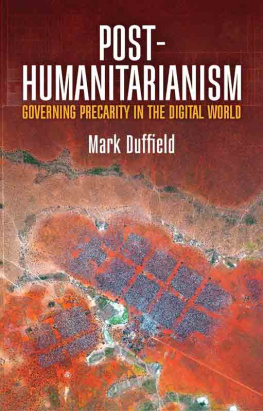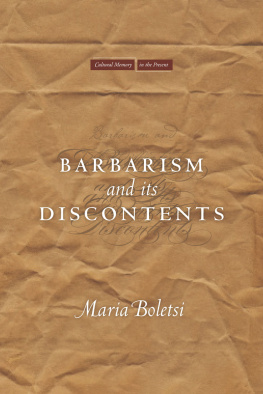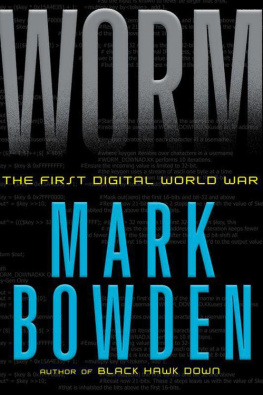Mark Helprin - Digital Barbarism
Here you can read online Mark Helprin - Digital Barbarism full text of the book (entire story) in english for free. Download pdf and epub, get meaning, cover and reviews about this ebook. publisher: HarperCollins, genre: Art. Description of the work, (preface) as well as reviews are available. Best literature library LitArk.com created for fans of good reading and offers a wide selection of genres:
Romance novel
Science fiction
Adventure
Detective
Science
History
Home and family
Prose
Art
Politics
Computer
Non-fiction
Religion
Business
Children
Humor
Choose a favorite category and find really read worthwhile books. Enjoy immersion in the world of imagination, feel the emotions of the characters or learn something new for yourself, make an fascinating discovery.
- Book:Digital Barbarism
- Author:
- Publisher:HarperCollins
- Genre:
- Rating:3 / 5
- Favourites:Add to favourites
- Your mark:
- 60
- 1
- 2
- 3
- 4
- 5
Digital Barbarism: summary, description and annotation
We offer to read an annotation, description, summary or preface (depends on what the author of the book "Digital Barbarism" wrote himself). If you haven't found the necessary information about the book — write in the comments, we will try to find it.
Digital Barbarism — read online for free the complete book (whole text) full work
Below is the text of the book, divided by pages. System saving the place of the last page read, allows you to conveniently read the book "Digital Barbarism" online for free, without having to search again every time where you left off. Put a bookmark, and you can go to the page where you finished reading at any time.
Font size:
Interval:
Bookmark:
A Writers Manifesto

I am all for your using machines, but do not let them use you.
W INSTON C HURCHILL
The Acceleration of Tranquility
Civilization and Velocity
Death on a Red Horse
The First Targets of the Barbarians Are Copyright and the Individual Voice
Notes on Virginia
Reclaiming Jefferson and Taking Care of Macaulay
The Espresso Book Machine
Using Machines to Hold Machines in Check
Property as a Coefficient of Liberty
Property is Not Antithetical to Virtue
Convergence
Wait as Long as You Want, It Will Not Come
Parthian Shot
Calling Barbarism for What It Is

Even were this book to begin in medias res, which, as an essay-memoir, it does not, a reader might benefit from a brief guide to the terrain it covers. This is especially so because of the chapter titles, which until the chapter is read and despite their subtitles, are for the most part opaque. In a conventional policy book you will not likely find a chapter entitled Death on a Red Horse, or one, the last, called Parthian Shot, which refers to an archery maneuver the ancient Parthians accomplished while retiring at full speed on their horses.
But in this book you will. That it is partly a memoir is not least in service of a principle it espousesthat man need not model himself, the way he lives, and by derivation even his arguments, after machines. In its complexity, mystery, intelligence, and beauty, humanity is unexcelled as a masterwork of God and nature. Why then must its qualities be filtered from argument and cleansed from reason as if they were pollutants?
We believe our nature to be, in the literal sense, primitive, lacking in grace and precision, unedifying, something always to be conquered and overcome. But think of the most complex and extraordinary machines mankind has yet devised, take ten of them, and combine their virtues. This tenfold constructionin terms of exactitude, critical timing, coordination, variety, miniaturization, adaptability, calculation, sensory function, integration, and balletic precision down to the atomic levelis neither a billionth as complex nor a billionth as wondrous as the very least among us. The most afflicted, deformed, and unconscious are yet miraculous by virtue of the human nature that, in imitation of the machine, we mistakenly strive to exclude from our deliberations.
It is both strange and unnecessary that we do so, given that the strongest expositions and appeals in history have come from the likes of Dante, Shakespeare, Milton, Montaigne, Lincoln, et al., who made use in them of the astonishments, beauties, and even the imperfections of our mortal nature. Thus, memoir to illustrate argument, so as not to rank the works that we have made above the work that we are.
Necessitated by that, and by a life (my own) spent writing fiction, is an obliqueness uncommon in modern nonfiction, a trust that the reader can, according to Shakespeares exhortation, by indirections find directions out. In my view, a reader is not something that pops up in a game of Whack-a-Mole, repeatedly to be hit over the head. If you are not Ann Coulter (the love child of two cellophane noodles), or Al Franken (the love child of a bratwurst), you need not be compelled to write like them.
When I was younger I would sometimes write speeches for politiciansexcept in two cases when the agreement was broken, always from deep anonymity and always without any compensation except a chance to view the horrible workings of government up close in the short space of time between my entry and my dismissal. It was difficult, in fact impossible, to convince most politicians that substance and style, strengthening one another ineffably, are inextricable and organic. With no further addition, the substance of something that is beautifully conveyed magically increases; and something that is conveyed beautifully shines all the more if it is of great substance. Although one always knows when it is there, the superior conjunction of these two elements is invisible. Thus the attraction, other than its encouragement of civilized reticence, of the oblique. And thus its powers.
What follows is an affirmation of human nature versus that of the machine, via a defense of copyright, the rights of authorship, and the indispensability of the individual voice. Of late, these have come under sustained attack. A movement that, whatever its ideological origins, finds its most congenial home and support in the geek city states of Silicon Valley, has successfully channeled and combined the parochial interests both of giant corporations and legions of resentful adolescents who believe that they have a natural right to whatever they want. It is known informally as the Creative Commons, and the charitable mask it presents, selfless people contributing their worksoftware, music, writingto the common weal, is merely the cover (not much bigger than a postage stamp) for a well organized effort to cut away at intellectual property rights until they disappear.
Its driving force, its Concord and Lexington, was the clash between youth who suddenly found that they could freely obtain all the music by which more than any other group they live, and the record industry, which attempted to stand athwart the flood of new technology and shout stop. The young people and their tools won, and the record industry has been transformed and diminished. In the face of a movement energized by victory in its first battle and enabled by technology that develops almost faster than anyone can assimilate it without altering his mental processes, intellectual property rights do not anymore enjoy the presumption either that they are justified or that they will endure.
That their decline or disappearance would benefit Google, large swaths of the academy, and content sharers is without question. But, as in a crowd looting a supermarket, or a junkie taking a hit, the surge of well being would be only temporary, with deprivation following on as the many threatened engines and instruments that supply the things that people would loot began to die. But despite the fact that (as illustrated by price controls or planned economies) when everything is free there is soon precious little or nothing of it, the attack continues apace. In a world turned upside down, indignant violators of copyright, abetted by tax-exempt public interest groups, aggressively sue copyright holders. The tide of opinion, driven by the internet, is running now largely against the idea of intellectual property, if only because relentless winds of propaganda state that to defend it is selfish and retrograde. Even at the risk of appearing selfish and retrograde, I defend it here.
The first chapter, The Acceleration of Tranquility, views without rancor the deeper elements of contention, which at its heart is an argument over different visions of the world. In it, we travel both with a British statesman to Lake Como in 1908, and by the side of a master of the universe in 2028to illustrate where we are now and where we might choose to be.
The second chapter, Death on a Red Horse, is trench warfare, blow for blow, involving the foot soldiers and some of the low-ranking officers of the armies drawn up against the rights of authorship and the individual voice. It begins with an incident of childhood and ends with the masterpieces of Brueghel and Bosch. The trench warfare could perhaps have been avoided. To cite Churchill, referring to Count Ciano, Mussolinis foreign minister, why talk to the monkey when the organ grinder is in the room? The answer is that in this case the monkeys are more important than the organ grinders. They are the infantry in which the ideas of their leaders and academic priests are realized. In their numbers, they are beyond the control even of those who work hardest to rile them up. To worry oneself too much with the theories of the professors would be analogous to having fought the Cold War by debating Soviet theoretician Mikhail Suslov in regard to the embarrassing intricacies of Marxist-Leninist thought. Apart from unavoidable forays, it is best to stay out of such thickets. As the manifestation of the theories shows, and as befits the state of the academy at present, the philosophical basis of the war on copyright is crackpot and stillborn. The actual battle is wherever the gnats in their millions crudely make real the musings of the Mad Hatters. We did not win the Cold War by debating Suslov but by making clear our principles, standing by them, and keeping an eye on the Red Army. That is, in a way, what I try to do in this chapter.
Font size:
Interval:
Bookmark:
Similar books «Digital Barbarism»
Look at similar books to Digital Barbarism. We have selected literature similar in name and meaning in the hope of providing readers with more options to find new, interesting, not yet read works.
Discussion, reviews of the book Digital Barbarism and just readers' own opinions. Leave your comments, write what you think about the work, its meaning or the main characters. Specify what exactly you liked and what you didn't like, and why you think so.

